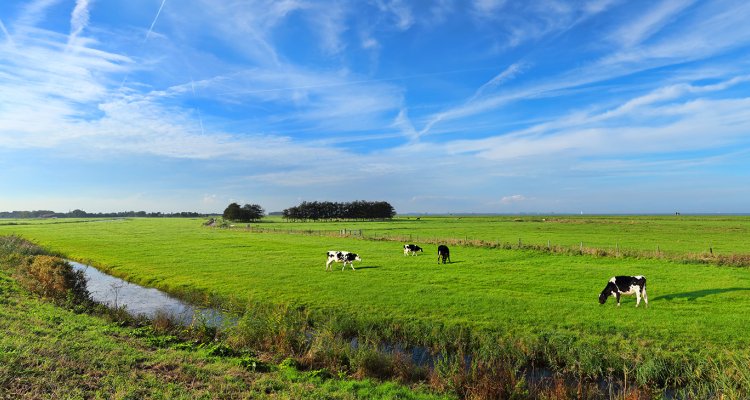
News
New forms of agricultural land ownership and leasing: An incentive for more land-based dairy farming?
With the aim of farming more extensively, societal actors are calling for more land-based dairy farming. However, the relatively high price of land in the Netherlands makes it difficult for many dairy farmers to become land-based. This stands in the way of the desired extensification. To help solve this problem, small-scale and larger-scale experiments with new forms of ownership and leasing of agricultural land are underway. At a time when high land prices provide an economic incentive to intensify, these new forms of ownership and leasing should offer farmers more opportunities to extensify.
Wageningen University & Research has studied four initiatives that are experimenting with new forms of ownership and leasing of agricultural land. This study was conducted as part of the public-private partnership (PPP) Toekomstbestendige en Verantwoorde Zuivelsector (A Future-proof and Responsible Dairy Sector). Research is being conducted within this PPP to support the Duurzame Zuivelketen (Sustainable Dairy Chain) partnership in achieving their 2030 sustainability goals.
The results of this study can be read in the publication ‘Verkenning nieuwe eigendoms- en pachtvormen voor landbouwgrond: Een stimulans voor een meer grondgebonden melkveehouder?' (Exploring new forms of ownership and leasing of agricultural land: An incentive for more land-bound dairy farming?)
The following initiatives have been explored:
Aardpeer initiative
By acquiring land with money derived from the issuance of interest-bearing bonds and then leasing it to farmers at a below-market price, the Aardpeer initiative aims to help farmers make their operations more sustainable.
Rijkdom land cooperative
The Land Cooperative Rijkdom wants to extensify farmland to benefit landscape quality and biodiversity, among other aims. The cooperative aims to achieve this by connecting farmers with private investors and encouraging them to purchase land together.
Land van Ons
The Citizens' Cooperative Land van Ons wants to reverse the depletion of soil and the disappearance of biodiversity in the Dutch landscape. It aims to achieve this by purchasing farmland and then leasing it to farmers who then manage it sustainably.
Regional Cooperative Buijtenland van Rhoon
In the Buijtenland van Rhoon region, a regional cooperative leases out land, owned by the Province of South Holland, to farmers in the region. To qualify for a lease, farmers have to extensify their operations.
Leasing costs are well below prevailing market rates
The leasing costs charged by the initiatives are significantly lower than the prevailing rates. At the Regional Cooperative Buijtenland van Rhoon, for example, farmers pay €426 per hectare per year. This is less than half the average rate in the region. Moreover, due to the additional conditions that the initiatives impose on the lease (e.g. restrictions on the use of pesticides or the obligation to create landscape elements), the lease prices must be lower than prices in the informal lease market and the free market.
The tight land market is hindering the explored initiatives
The initiatives explored in this study appear to offer a solution to the sharply rising prices for agricultural land by reducing the high cost of land purchasing or leasing for farmers. However, this does not solve the problem of land scarcity. The limited availability of land may therefore still hamper the extensification of farming operations. Moreover, few possibilities for reducing the scarcity of agricultural land are available. To reduce scarcity, either the area of farmland should be increased or faster turnover in the land market should be incentivised. Unfortunately, the area of farmland is expected to decline in the future in favour of other uses, such as nature reserves and housing.
Low return on investment
Given the initiatives' ambition to reduce the cost of buying or leasing land, it is not surprising that the returns for investors in these initiatives will be limited. For example, the Land van Ons initiative offers a very modest direct return of 0.1% to 0.3%. By comparison, over the past 30 years, the average total return on regular leased land has been around 7%. The returns in the studied initiatives are therefore very low and thus pose a risk to investors. However, there is a certain group of investors who place less emphasis on financial returns and instead prioritise the societal and sustainability aims of these initiatives.
Initiatives are limited in scope
The scope of the initiatives in the study is currently very limited. The area of land under extensive management, especially if only dairy farmers are considered, is a particularly small proportion of the total area of arable land or grassland. The question is whether the initiatives can be scaled up, certainly when considering constraints such as limited land availability and limited return on investment. Due to the limitations in the market, the ambitions of the Aardpeer and Land van Ons initiatives to expand on a large scale are laudable, but may not be realistic.